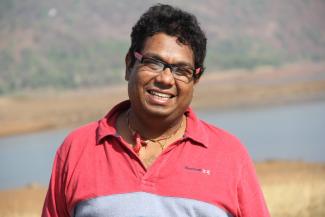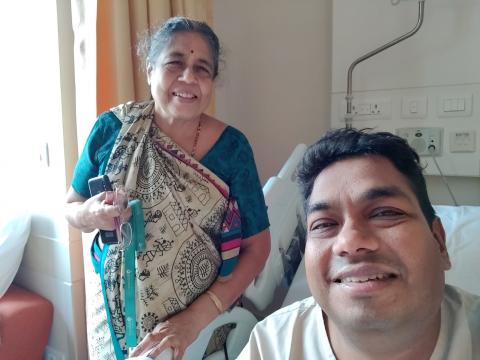
Samiir Halady, has lived with Chronic Kidney Disease for 20 years and is now a transplant recipient. He shares how he balances the challenges of living with his work and his love for trekking and travel. And the secret ingredients that keep him going.
Please introduce yourself Samiir
I am Samy or Sam (as my friends address me). I have been doing peer counselling for last 15 – 16 years and from 2020. I drive some of the initiatives of the Amar Gandhi Foundation. I am a sensitive, emotionally strong, go getter with lots of will power and inner strength. I have a great sense of humour and a special way with words.
An MBA from a premier institute, I am a pioneer in the field of Digital Marketing and Strategy since 2007. My passions are hiking, travel and photography and music. I used to actively write a blog for kidney patients which was recommended by UK Kidney Research Foundation.
Please tell us a bit about your condition - when were you diagnosed, the early symptoms? Is there a family history?
Diagnosed in 2001. Early symptoms were high blood pressure followed by investigations and then diagnosis of Chronic Kidney Disease. There is no family history of kidney disease
How did you balance dialysis with work schedules? How did the dialysis and dietary changes affect your social life and activities like trekking?
I kept away from trekking for around 4 years after I started on dialysis. Then I felt like a fish out of water. I talked about this with my mother and expressed my desire to go to the mountains again. She simply said – “Go if you feel confident. But the moment you feel uneasy return immediately.” I had been trekking since 1992. I knew and had worked with a few people who lived on certain trekking routes. So I went with few trusted friends and started
About Managing Time
A typical day started at around 9:30 am. Work in the office from 10am to 6pm on dialysis days. On other days I used to work pretty late, sometimes even had to stay back in office. But I was fortunate that my employers never minded me leaving the workplace at 6 pm whenever I had to go for dialysis.
After I got home, I used to have dinner and then leave for dialysis. This would go on till around 2 am at least. Sometimes it went on till 4am if there was an emergency dialysis scheduled before mine (I was C positive and there was only one machine). I used to be back again at work again next morning. This went on for the 17 years from 2002 to 2019 when I was on dialysis.
My friends and colleagues respected my ability to perform well in adverse conditions even I as I kept up my late night dialysis and have cited my example in discussions. This really made me feel like I was on top of the world
Trekking used to be only a weekend activity. One day treks on Sundays as few members used to have 6 day working weeks. There were some overnight treks for which I used to finish dialysis at 2 am and then start for the trek at around 4:45am in the morning
It was a passion for me so my body allowed it.
When was the transplant? How did you manage the preparation for transplant and post transplant?
Transplant was on 27th June 2019. I recently completed 2 years.
No preparation was required before transplant. But I did a road trip as I knew I wouldn’t be able to do one for a long time post transplant. I had never anticipated that Corona would strike though. I ate a few things that I love. And kept myself fit enough so the surgery doesn’t get postponed
Post transplant I needed to stay isolated. For two months I stayed at my childhood friend’s (also neighbour) vacant place which was really helpful. We organized a male help till I had some pain in the surgery area. But I was good in 1.5 months after discharge.
Was transplant always on the cards? What were the factors involved? Was the decision difficult? What was the deciding factor when you went ahead
Yes it was. Initially when I started on dialysis both my parents were willing to donate but both had different blood groups so were not able to donate. So I waited for a cadaver. In around 2006 when I got a call for a Cadaver kidney first time I didn’t get it. Before the second call I tested positive for Hepatitis C Virus and Geno Type 1 which was tricky. So based on hepatologist advice I opted out of the cadaver queue.
I got the treatment for the Hepatitis C virus in 2018 and after that went for transplant. At this point, incompatible blood groups could donate and my mother passed all fitness parameters. So we went ahead with the transplant.

Impact on life choices, on family dynamics, social choices
Biggest decision I made once I started on dialysis was decided not to get married. I felt it is not fair to the partner as I had seen people die on the dialysis machine. Of course, I always missed a companion.
I had to totally give up playing the Tabla which I loved.
I thought I had to give up hiking but resumed it once it got too much for me to handle
Talk to us about the role of humour.
Humour comes naturally. I love to play with words. I don’t plan my humour. In most cases its spontaneous.
I remember once, I was taking dialysis and my BP went extremely low. They were not even able to measure the diastolic. The nurse in the hospital was attending to me. I was getting a feeling of sinking, and was finding it difficult to even open my eyes.
The sister was very tense. She was also a good friend and I could see the tension when I just happened to open my eyes slightly. My spontaneous reaction was “Some people look so much better when they are tense”
She immediately smiled and the tension eased
Once when I had a fall during a hike that I was leading, everyone were feeling scared of falling themselves. So I laughed it out and told them Tum log ko kuchh nahin hoga. Main toh vaise bhi bahut gira hua insaan hoon.
It made the whole group more relaxed
Challenges – medical, physical, emotional, social, pain management. Include side effects of the various treatments.
I went through all of the above challenges. Worst was when I had injuries that I sustained while trekking along with the bone pain due to side effects of long term dialysis. It was very difficult when I couldn’t even climb staircases, but my refrain was “Main bahut gira hua insaan hoon” and everyone cooperated
Has it been difficult emotionally to cope with your condition? Did you see a counsellor to help cope with the emotional distress?
Emotionally I guess it was tough. When I was told I would be lifetime on dialysis it was very bad. I came home and practiced mauna (silence) for two days along with intense spiritual practice. After two days I was ready to face anything.
Yes it was more difficult as I am single and it does feel extremely lonely at times. Also as I mentioned earlier, I have always missed a companion. I keep myself occupied so I didn’t feel depressed.
I always had lots of activities and I have been very active in my community, in other Socio Cultural organisations etc. I used to blog, go hiking, Road Trips, Photography etc. I am also associated with conservation of Olive Ridley Turtles in the Western Konkan Coast, etc.
What is the hardest part of living with the condition? What were some of the challenges you faced and what is your advice to patients who face similar challenges?
Well the situation is difficult. There are complications that can happen during dialysis plus after as well. We need to take it in our stride.
If the machine wasn’t there I would have been a dead man in 2002. I am still alive and kicking in 2021 thanks to the machine
As I had written in one of my blog posts about the oft-quoted saying Glass Half full or Half empty - when it comes to life and death its never half dead or half alive. Either we are alive or dead.
If we are alive, be fully alive
Have you learnt anything in managing in your condition that you wish you knew before?
My personality transformed. I think I have become much stronger emotionally. There were times I had no money in my pocket or bank. Somehow it used to come from somewhere just in time for dialysis payment
I started trusting the divine and I firmly believe that the divine has kept me alive for some task which is till now unknown to me. My role in the universe is yet to be revealed
About my Association with Amar Gandhi Foundation
When I was recuperating in hospital immediately after my surgery, Dr B V Gandhi came to me and asked me to be associated with his NGO. It was something that I could not decline.
Apart from the various initiatives of Amar Gandhi Foundation that I drive, I am particularly proud of the transport solutions I worked on for dialysis patients during the lockdown (check the video below), less than one year after transplant. I organised the following
- Volunteers of Jan Kalyan Samiti who came in their own vehicles and ferried patients between home and hospital
- Discounted rates for patients in EzyMov, a Wheel Chair Enabled Taxi Service
- App Based Taxi operators who launched special services from home to hospital for patients.
We are also working with Mohan Foundation on an initiative called “AtmaNirbhar” where we are working on creating employment opportunities for organ failure patients. This includes creating awareness with potential employers, as also with patients on the constraints and expectations of both parties. We are also working on ideas to develop specific skill sets so patients can be self employed and earn a living.
Complete the sentence
My motto in life: If we are alive, be fully alive
I was inspired by: Swami Vivekananda ( The history of the world is the story of a few men who had faith in themselves)
The funniest moment was: I was trying to help my team cross a tough stretch during a hike and myself had a fall (Humpty Dumpty)
The most annoying moment: When someone said I am helping people to become famous
The best thing someone said: My one liners are so wholesome he shares them with his kids
I love: Positivity
I hate: liars
I fear: snakes
My biggest support: mom
The best gift I got : my moms kidney
I wish: True happiness for everyone






